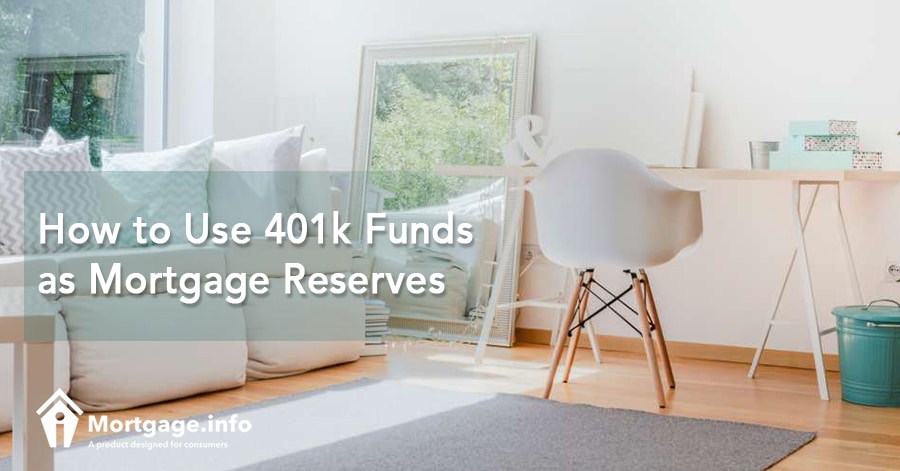When you apply for a mortgage, you may need more money than the down payment and closing costs combined. Sometimes lenders and/or certain loan programs require you to have mortgage reserves. This is money you use in the event that you lose your job or your income decreases. It gives the lender reassurance that you can afford the mortgage payments no matter what happens down the road.
Looking for Current Mortgage Interest Rates? Click Here.
Your reserves must be liquid. In other words, you can turn them into cash quickly. Things that are not typically counted as reserves are vehicles and other personal assets that you must sell in order to have the cash. Reserves are typically bank accounts, stocks, bonds, or 401K accounts that you can verify their balance at any given time.
How 401K Funds are Counted as Reserves
Technically, your 401K account is for when you retire. However, you may be able to dip into the funds under certain circumstances. Before you do, though, you’ll pay penalties and owe taxes. Because of this, your lender can only use 75% of the value of your 401K account.
Here’s an example:
If your 401K balance is $100,000, the lender cannot use the full $100,000 for qualifying. Instead, they can use 75% of it, or $75,000. The other $25,000 should cover the taxes and penalties for withdrawing the funds early.
Another quirk, however, is that you must be fully vested. If you cannot prove that 100% of the funds are yours if you left your job, you cannot use the funds. You’ll have to provide the lender with proof that you are 100% vested. If you are not, the lender can only use the funds that are yours (the money you invested yourself). Again, they will use 75% of that amount.
How Much do You Need in Reserves?
Generally, for a primary residence, you don’t need mortgage reserves. But, there are exceptions to the rule.
If you are buying a primary residence, but have a credit score lower than 660, the lender may require reserves. They may also require it if you have a high LTV and are considered a ‘risky lender.’ Lenders often add this overlay when they think you may default on the loan. Here are a few examples:
Click to See the Latest Mortgage Rates.
Joe has a credit score of 650 and only puts 5% down on the home. Even though the FHA guidelines may allow this, Lender A considers this risky. They would prefer it if Joe had 6 months of mortgage payments on hand. This way if he loses his income, he has the reserves to continue making the mortgage payment.
John has a credit score of 675, but he needs cash out of the equity of his home. This makes his loan risky as he is increasing his loan amount. Even though he is taking cash out, the lender may require some type of reserves to ensure that he can make his mortgage payments moving forward.
If you purchase or refinance a second or investment home, you may need mortgage reserves as well. Again, it’s often up to lender discretion. You may even find different requirements from lender to lender. It pays to shop around and see which lender has not only the best interest rate, but also the most favorable requirements.
Risking Your 401K
The good news is that you are not risking your 401K if you use it as reserves. This doesn’t mean you’ll have to cash in your retirement fund. It simply serves as a ‘compensating factor.’ It lets the lender know you have other money you can use to make your mortgage payments if something happens.
No one can predict the future. You don’t know if you’ll fall ill, get hurt, or lose your job. This is the risk a lender takes. They know you can make your mortgage payments now, but what if you can’t make them in the future? The only backup they have is if you have some type of reserves, such as the 401K account. Chances are you would cash in your 401K in order to keep your home. Your retirement funds won’t do you much good in the future if you don’t have a place to live.
If you have 401K funds, they can help you get more favorable terms on a loan. A lender may consider them a compensating factor and give you better terms or even a lower rate. Talk to different lenders and see what your reserves can get you. It’s never a ‘bad’ factor when you have more money available to help pay your bills. Use it to your advantage in order to get the best deal on your new mortgage.

